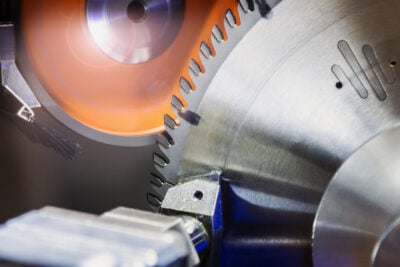Getting Started with Saw Grinding Improvements
Before deciding to change to different diamond wheels in your saw grinding operations, consider the result you are looking to achieve. Usually, the answer revolves around having wheels that cut cool and remove carbide quickly. The goal should be to produce more finished saws in a day, rather than focusing on wheel price. Just because wheels are cheaper doesn’t mean that they will save you money in the long run.
Diamond wheels are necessary for grinding carbide efficiently. Since the introduction of synthetic diamond to the grinding industry, their use has expanded exponentially. As time has passed, the diamond particles have become less resistant to shock and more uniform in size. Improvements in the coatings that hold the diamond particle in the bond have also contributed to extended wheels’ life.
Saw Grinding Bonds
Here at Eagle, we offer multiple bond types for specific applications. When it comes to carbide-tipped saw blades, however, resin is the bond of choice. Metal bonds are useful on non-metallic surfaces like glass or ceramics, but not when it comes to carbide. Metal bonds are simply too aggressive.
Perfecting the Formulation
Eagle’s engineers can formulate resin bond wheels in numerous grades and hardnesses. Our diamonds also come in multiple grit sizes and offer different coarseness options. 60/80 mesh is the coarsest, whereas a 2,000-grit will offer a mirror finish for saws for plastics. We commonly manufacture grits as fine as 1,000-1,200, however, we can manufacture up to 2,000 for specialty applications.
A finer grit wheel offers a smoother finish on carbide saw blades. It also lengthens the life between sharpening, improves the quality of the cut, and requires less power than saws with rough grinds, but a finer grit also means that material cannot be removed as quickly. When grinding saw blades, you want to eliminate as much lateral movement as possible. Make sure the blade is clamped close to the tip being ground. Pushing a wheel too hard can cause issues with deflection in the machine or cause the wheel to push off the tip. Using a wheel too hard for the type of infeed and material removal can also cause the same issue. It is important to have a conversation with an engineer to carefully select the formula that will work best for your operation.
With the wheel width set, match the abrasive and grit to the chain you’re sharpening.
Selecting Wheels for Industrial Wood Tools
For production saw shops and tool rooms, the right spec drives cycle time, finish, and tool life.
- Carbide-tipped saws/profile cutters/router bits: Diamond (resin typically, vitrified/metal for form holding).
- HSS/M2/M42/D2 knives & tools: CBN (better for ferrous steels).
Grit: Coarse for speed; fine for edge quality with lighter passes.
Coolant: Use coolant preferably, if dry grinding (not recommended) use a strong extraction system.
Operational Variables
There is a pronounced difference in the “grindability” of various grades of carbide, with some creating more wheel wear than others. Increased cobalt content in the carbide makes the carbide more impact resistant, but can also load a wheel quicker. It is important to consider the concentration of the diamond wheel as well. An increase of diamond particles improves grinding performance. The extended life of the wheel will benefit your operational profitability. An increase of diamond concentration up to 125 greatly improves the grinding performance, but might make the wheel harder and less efficient. Wheels with 50 or lower concentration of diamond should be carefully considered.
It should be noted that speed, traverse rate, and diamond concentration play a large part in carbide grinding success. These variables should be closely evaluated and monitored over time. Keeping a record of facts and figures over time can assist your engineer in identifying any changes to the grinding wheel that need to be made.
Identifying and Reducing Diamond Wheel Wear
If your current supplier’s diamond wheel is wearing quickly, it may be caused by the following things:
- Breakdown due to heat (feeding too quickly or too much wheel contact).
- Dry grinding too quickly.
- Grit size of your diamond wheel.
- Improper use and over-dressing.
- Wrong concentration and/or bond formulation
Keeping a record of facts and figures over time can assist your engineer in identifying any changes to the grinding wheel that need to be made.





